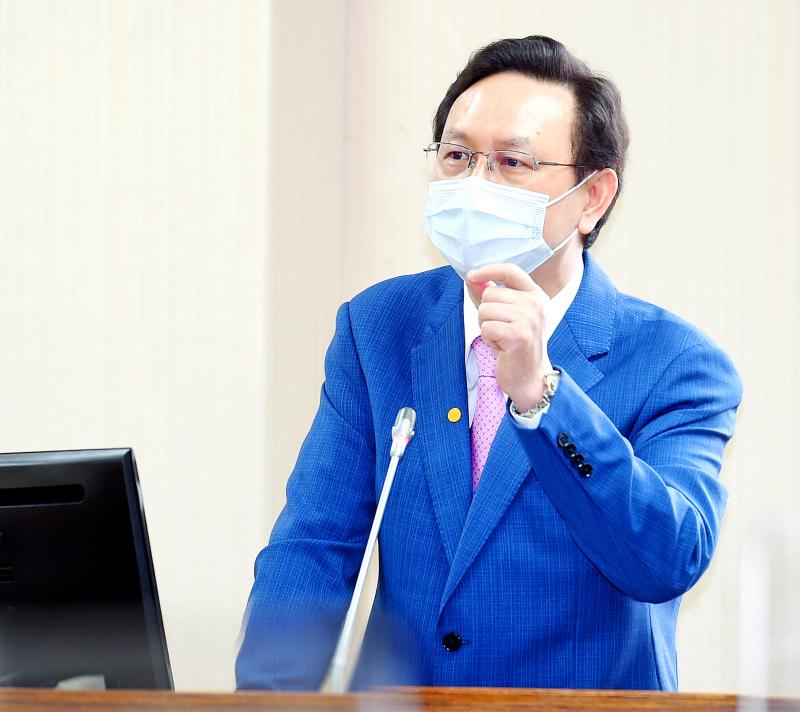Chinese attempts to influence overseas communities has “never ceased,” even as Taiwan seizes opportunities to expand its educational reach abroad, Overseas Community Affairs Council Minister Tung Chen-yuan (童振源) said yesterday, while urging continued vigilance against Beijing’s “united front” campaigns.
Speaking at a regular meeting of the legislature’s Foreign Affairs and National Defense Committee, Tung discussed China’s recent “united front” efforts abroad.
Beijing has been revealing its ambition to endanger the global order through authoritarianism, he said, citing its deliberate concealment of COVID-19 at the beginning of the outbreak in Wuhan in 2019, crackdowns in Xinjiang and Hong Kong, and sabotage of cross-strait relations, as well as infiltration of academia through its Confucius Institutes.

Photo: Chu Pei-hsiung, Taipei Times
These actions have deepened distrust of China among global democracies such as Australia, the UK and the US, and countries in Europe, which have been shutting the institutes down in droves, he said.
Various high-level government officials and international organizations have reiterated the importance of stability in the Taiwan Strait and Indo-Pacific region — including the Quadrilateral Security Dialogue and the AUKUS security alliance of Australia, the UK and the US — underscoring their deep concern for Taiwan’s strategic value, he said.
Amid such international support, Taiwan has more opportunities to promote Chinese-language education and connect with overseas communities in the US and Europe, Tung said.
However, Tung also called for vigilance against unceasing “united front” attempts to influence overseas communities.
The nation has been taking advantage of countries’ closing their Confucius Institutes to expand its own educational reach abroad, making effective use of Taiwan’s advanced educational technologies and quality instruction, Tung said.
By the end of March, the council had helped establish 45 Taiwan Centers for Mandarin Learning in the US and Europe, he said.
Overseas communities have also expressed their support of Taiwan by promoting the nation’s involvement in international organizations, Tung added.
For example, 163 events were held in 43 regions last year calling for Taiwan’s participation in the World Health Assembly, with participation from 800 organizations and 17,055 people, he said.
In North American alone, 41 events involving 316 overseas community groups and 6,000 participants called for Taiwan’s inclusion in the UN, he added.
After the nation on Sept. 22 last year officially applied to join the Comprehensive and Progressive Agreement for Trans-Pacific Partnership, the World Taiwanese Chambers of Commerce also established a working group to promote Taiwan’s inclusion, Tung said, touting the examples as confirmation of a deep passion for Taiwan among its overseas communities.

Trips for more than 100,000 international and domestic air travelers could be disrupted as China launches a military exercise around Taiwan today, Taiwan’s Civil Aviation Administration (CAA) said yesterday. The exercise could affect nearly 900 flights scheduled to enter the Taipei Flight Information Region (FIR) during the exercise window, it added. A notice issued by the Chinese Civil Aviation Administration showed there would be seven temporary zones around the Taiwan Strait which would be used for live-fire exercises, lasting from 8am to 6pm today. All aircraft are prohibited from entering during exercise, it says. Taipei FIR has 14 international air routes and

The Ministry of National Defense (MND) today released images of the military tracking China’s People's Liberation Army (PLA) movements during the latest round of Chinese drills around Taiwan. The PLA began "Justice Mission 2025" drills today, carrying out live-fire drills, simulated strikes on land and maritime targets, and exercises to blockade the nation's main ports. The exercises are to continue tomorrow, with the PLA announcing sea and air space restrictions for five zones around Taiwan for 10 hours starting from 8:30am. The ministry today released images showing a Chinese J-16 fighter jet tracked by a F-16V Block 20 jet and the

Snow fell on Yushan (Jade Mountain, 玉山) yesterday morning as a continental cold air mass sent temperatures below freezing on Taiwan’s tallest peak, the Central Weather Administration (CWA) said. Snowflakes were seen on Yushan’s north peak from 6:28am to 6:38am, but they did not fully cover the ground and no accumulation was recorded, the CWA said. As of 7:42am, the lowest temperature recorded across Taiwan was minus-5.5°C at Yushan’s Fengkou observatory and minus-4.7°C at the Yushan observatory, CWA data showed. On Hehuanshan (合歡山) in Nantou County, a low of 1.3°C was recorded at 6:39pm, when ice pellets fell at Songsyue Lodge (松雪樓), a

City buses in Taipei and New Taipei City, as well as the Taipei MRT, would on Saturday begin accepting QR code payments from five electronic payment providers, the Taipei Department of Transportation said yesterday. The new option would allow passengers to use the “transportation QR code” feature from EasyWallet, iPass Money, iCash Pay, Jkopay or PXPay Plus. Passengers should open their preferred electronic payment app, select the “transportation code” — not the regular payment code — unlock it, and scan the code at ticket readers or gates, General Planning Division Director-General Liu Kuo-chu (劉國著) said. People should move through the